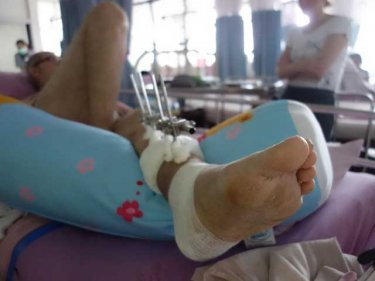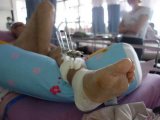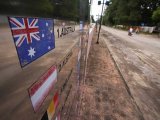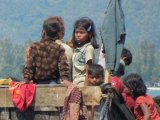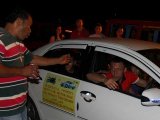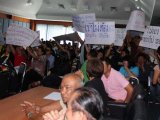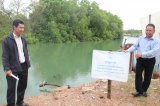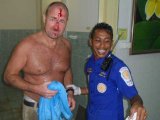PHUKET: An Australian man who plunged from a hotel balcony on the eighteenth floor in November is well on his way to recovery and plans to return to Australia later this month.
''Eighteen floors, that's got to be a world record,'' said the 39-year-old, who requested anonymity when reporters spoke with him at the Vachira Phuket Hospital.
''It doesn't seem real,'' he said. ''I know people in here who have fallen from three floors and had similar injuries. Eighteen is just a massive number. But it makes you value life a little bit more.''
Even if you take into account that Thais label the ground floor the first floor, 18 floors is a massive distance to fall.
It has been almost two months since his plunge from a balcony at Phuket's Royal Paradise Hotel in Patong.
What saved his life was a second-floor awning that cushioned his body as he crashed through it. Then he hit the ground, alive.
A hotel staffer who was in the coffee shop on the second floor about 1pm on November 13 heard the sudden loud noise.
She thought that the man - other diners saw him flash past the window - would definitely have been killed.
''It was a very big bang,'' she said later. ''He's alive? That's amazing.''
The man, who is from Sydney, is now on regular painkillers after medical staff weaned him off the morphine that helped him through the worst days following his fall.
The crash left him with serious injuries including a severely broken left leg, a ruptured spleen, broken ribs and a shattered wrist. Remarkably, he did not suffered any lasting brain injuries.
He can sit up and practices standing to prepare for a flight to Australia, where he will have further operations and continue with his mental recovery.
He hopes to leave Phuket as early as Friday, he says.
''So far we've only achieved standing up and then falling into a wheelchair, and that's all I really need to do anyway,'' he said.
''So, on a plane I have to fall from one seat to the next and be able to go to the bathroom. That will have to be perfected, I guess, over the next week.''
It has not been an easy recovery process. He is left handed, and the worst of his injuries affect the left side of his body.
''It's a difficult task when you've always relied on your left hand side. You kick with your left and write with your left hand, and all of a sudden you can't use the left at all . . . it's very difficult to adapt to and not as easy as you'd think.''
He still experiences pain on a daily basis. And there are limits to the care that Vachira Phuket, a public hospital, can provide.
Vachira Phuket is sometimes so crowded that mothers who have just given birth are placed on mattresses in corridors with their newborns.
''It's still pretty bad, to tell you the truth,'' he said. ''Compared to first world Australian hospitals, if you're used to those,'' he says.
It can be difficult communicating with staff, there's no buzzer for nurses and sometimes the staff is not as responsive as it should be to his requests for help.
''Sometimes you do need help immediately,'' he says. ''I don't want to be down on the hospital. It's been good to me as well. But there's certainly room for improvement.''
Visitors to the hospital ward he shares with about 20 other patients make his stay easier. His girlfriend, a Thai beautician based in Patong, comes to see him on a regular basis.
Her visits were daily at the start and now every second day or so, ''depending on what's going on.''
The man's sister and brother-in-law travelled to Phuket from Brisbane after the incident, before returning home because of work commitments. He had a visit from officials from the Australian embassy, too.
''They flew down here [from Bangkok] and sat with me for a little while,'' he said. ''So that was pretty impressive.''
He has also made friends with the husband of a patient in the next ward.
''There was this German guy who was in here visiting his wife a lot, and you know, he likes a beer and I like to have a bit of a chat, so now when he comes in to visit his wife . . . he just comes around after 20 minutes and has a chat to me for about 15 minutes. He's just a nice bloke.''
Watching television and movies on a laptop, mostly comedies, helps him through the nights when he has difficulty sleeping. He has a phone with a local number but no access to the internet.
''You have to keep focused, I guess, and get ready for something that's going to challenge me,'' he said.
''Whereas, here I think I dumb myself down big time. All I can do is watch TV or movies. I don't get to read the newspaper, and haven't had any internet for the last two months.''
After returning to Australia, he is likely to be in hospital for another two months, and is looking forward to returning to work after that, and ''earning some dosh.''
''Being locked up in here for the last two months almost, I'm not earning any money . . . everything's very expensive now, including the hospital bill.''
The man has been in Thailand since May last year, ''mainly holidaying.'' The plunge has not deterred him from coming back one day, when he is able.
Additional Reporting: Chutima Sidasathian
Sophie Brown, a journalism masters student at the University of Hong Kong, is currently an intern at Phuketwan. She is a former communications officer at the anti-corruption organisation, Transparency International.
''Eighteen floors, that's got to be a world record,'' said the 39-year-old, who requested anonymity when reporters spoke with him at the Vachira Phuket Hospital.
''It doesn't seem real,'' he said. ''I know people in here who have fallen from three floors and had similar injuries. Eighteen is just a massive number. But it makes you value life a little bit more.''
Even if you take into account that Thais label the ground floor the first floor, 18 floors is a massive distance to fall.
It has been almost two months since his plunge from a balcony at Phuket's Royal Paradise Hotel in Patong.
What saved his life was a second-floor awning that cushioned his body as he crashed through it. Then he hit the ground, alive.
A hotel staffer who was in the coffee shop on the second floor about 1pm on November 13 heard the sudden loud noise.
She thought that the man - other diners saw him flash past the window - would definitely have been killed.
''It was a very big bang,'' she said later. ''He's alive? That's amazing.''
The man, who is from Sydney, is now on regular painkillers after medical staff weaned him off the morphine that helped him through the worst days following his fall.
The crash left him with serious injuries including a severely broken left leg, a ruptured spleen, broken ribs and a shattered wrist. Remarkably, he did not suffered any lasting brain injuries.
He can sit up and practices standing to prepare for a flight to Australia, where he will have further operations and continue with his mental recovery.
He hopes to leave Phuket as early as Friday, he says.
''So far we've only achieved standing up and then falling into a wheelchair, and that's all I really need to do anyway,'' he said.
''So, on a plane I have to fall from one seat to the next and be able to go to the bathroom. That will have to be perfected, I guess, over the next week.''
It has not been an easy recovery process. He is left handed, and the worst of his injuries affect the left side of his body.
''It's a difficult task when you've always relied on your left hand side. You kick with your left and write with your left hand, and all of a sudden you can't use the left at all . . . it's very difficult to adapt to and not as easy as you'd think.''
He still experiences pain on a daily basis. And there are limits to the care that Vachira Phuket, a public hospital, can provide.
Vachira Phuket is sometimes so crowded that mothers who have just given birth are placed on mattresses in corridors with their newborns.
''It's still pretty bad, to tell you the truth,'' he said. ''Compared to first world Australian hospitals, if you're used to those,'' he says.
It can be difficult communicating with staff, there's no buzzer for nurses and sometimes the staff is not as responsive as it should be to his requests for help.
''Sometimes you do need help immediately,'' he says. ''I don't want to be down on the hospital. It's been good to me as well. But there's certainly room for improvement.''
Visitors to the hospital ward he shares with about 20 other patients make his stay easier. His girlfriend, a Thai beautician based in Patong, comes to see him on a regular basis.
Her visits were daily at the start and now every second day or so, ''depending on what's going on.''
The man's sister and brother-in-law travelled to Phuket from Brisbane after the incident, before returning home because of work commitments. He had a visit from officials from the Australian embassy, too.
''They flew down here [from Bangkok] and sat with me for a little while,'' he said. ''So that was pretty impressive.''
He has also made friends with the husband of a patient in the next ward.
''There was this German guy who was in here visiting his wife a lot, and you know, he likes a beer and I like to have a bit of a chat, so now when he comes in to visit his wife . . . he just comes around after 20 minutes and has a chat to me for about 15 minutes. He's just a nice bloke.''
Watching television and movies on a laptop, mostly comedies, helps him through the nights when he has difficulty sleeping. He has a phone with a local number but no access to the internet.
''You have to keep focused, I guess, and get ready for something that's going to challenge me,'' he said.
''Whereas, here I think I dumb myself down big time. All I can do is watch TV or movies. I don't get to read the newspaper, and haven't had any internet for the last two months.''
After returning to Australia, he is likely to be in hospital for another two months, and is looking forward to returning to work after that, and ''earning some dosh.''
''Being locked up in here for the last two months almost, I'm not earning any money . . . everything's very expensive now, including the hospital bill.''
The man has been in Thailand since May last year, ''mainly holidaying.'' The plunge has not deterred him from coming back one day, when he is able.
Additional Reporting: Chutima Sidasathian
Sophie Brown, a journalism masters student at the University of Hong Kong, is currently an intern at Phuketwan. She is a former communications officer at the anti-corruption organisation, Transparency International.

